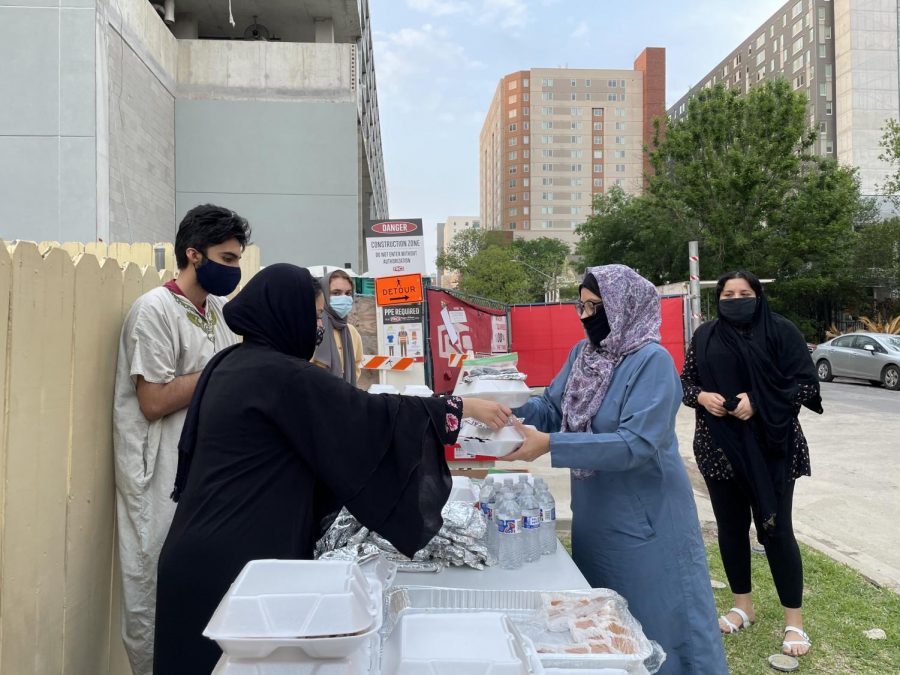Muslim students reflect on isolation, community during Ramadan, balance schoolwork, spirituality
April 23, 2021
Editor’s Note: This article first appeared in the April 20 issue of The Daily Texan.
In the quiet hours before sunrise, Adam Ghanem wakes up to prepare for a day of fasting. This month marks his first Ramadan spent away from home.
“This is definitely the first time I’ve fasted without any real support,” said Ghanem, a mechanical engineering freshman. “Here, I feel like it’s a lot more about myself and my own development than the community (aspect).”
When the arrival of the crescent moon signals the start of Ramadan, Muslims around the world prepare for 30 days of spiritual reflection and daily fasting. After a full day of forgoing food and water, Muslims commonly gather to eat a dinner called iftar and attend evening Taraweeh prayers.
“The community is never closer than during Ramadan,” public health sophomore El-Shymaa Mohamed said. “It’s a very different feeling, (having) iftar with all your friends than when it’s just by (yourself).”
This year, gatherings are smaller to avoid the risk of COVID-19. Some students are celebrating Ramadan alone and others have returned home to their families.
“Our main goal in having a mosque near campus was to have a good place for students to come and have that community feel,” Suhaimia Suleman, vice president of Nueces Mosque, said. “Since everything is online, you don’t really feel that, especially the freshmen that have never (been).”
Because Ramadan follows the lunar calendar, the dates of the holiday shift back by 10 to 12 days every year. For the past few years, Ramadan has fallen at the end of April or beginning of May, aligning closely with final exams.
“As a student, you’re not fully able to avail this month,” neuroscience senior Suleman said. “As a senior, … I have to decide whether to give more attention to schoolwork or more time to prayers.”
After the sun sets, Muslims are permitted to eat and drink before a meal called Suhoor near sunrise. Some students said they have reworked their sleep schedules around this time to preserve energy.
“It’s definitely a hurdle that’s going to need to be crossed,” Mohamed said. “By 10 o’clock, I need to be asleep so that I can wake up at 5 o’clock.”
Ghanem said a challenge this month may be finding a meal in the dining hall. On Fridays and Saturdays, Jester 2nd Floor Dining closes at 8 p.m., just before Ghanem is able to break his fast.
“I texted my RA about it … (but) I honestly don’t know what I’ll do,” Ghanem said. “I’m afraid that I’ll go to the line and there (won’t be) many options.”
Although students cannot eat dinner on the property, Suleman said the Nueces Mosque offers grab-and-go iftar meals for students.
“People can just come and pick it up, … and then after they’re done they can come back for Taraweeh prayer,” Suleman said.
A central focus of Ramadan is minimizing distractions and focusing on one’s inner faith. Biomedical engineering sophomore Hebah Tanveer said she practices mindfulness by writing daily journal entries.
“(I like) to track how my prayers went and how much Quran I was able to get through,” Tanveer said. “(Ramadan) isn’t just about not eating or drinking. It’s about pulling yourself away from the world and temporary happiness.”
Despite adjusting to new circumstances, Tanveer said she looks forward to growing as a Muslim and strengthening her relationship with God.
“Ramadan comes every year at a time when I really need it,” Tanveer said. “It’s sort of an eraser for your chalkboard. It gives you a clean slate, and you’re able to start anew.”



